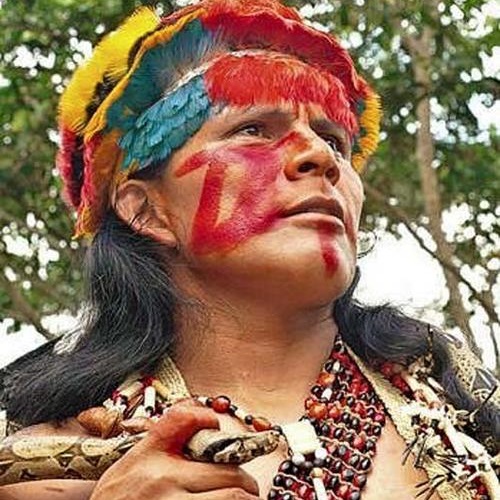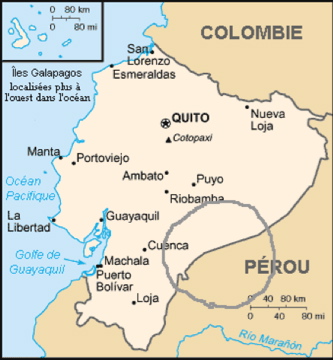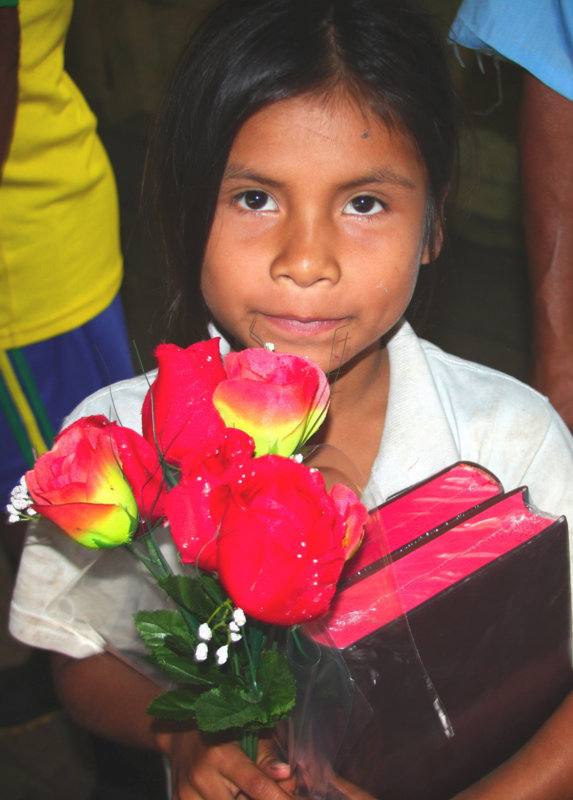In brief
Language: Shuar a.k.a. Jivaro (ISO code: jiv)
Speakers: about 35,000 in Ecuador and in Peru
Edition: Bible, delivered in July 2010Partner mission: Avant Ministries
Reference: Ethnologue data | Langscape map
A revival among the Shuar, formerly the Jivaros!
 The Shuar, the best-known indigenous tribe of the Upper Amazon region, were formerly known as the Jivaros, meaning “bloody savages.” But this insulting name was legally rejected in 1964 and the Shuar are now known by the name they call themselves.
The Shuar, the best-known indigenous tribe of the Upper Amazon region, were formerly known as the Jivaros, meaning “bloody savages.” But this insulting name was legally rejected in 1964 and the Shuar are now known by the name they call themselves.
Holding on to their independence, the Jivaros were fierce warriors who blocked the invasion of the Incas in the 14th century. The Spanish, drawn by rumors of gold in the 16th century and by rubber in the 19th century, were stopped by the violence of the Jivaros in this hostile, impenetrable region of the Upper Amazon.
The Jivaros would cut off their enemies’ heads, empty and shrink them and sew their mouths and eyes shut to keep the spirits of their enemies from escaping and seeking revenge. This is one of their shamanic traditions called the “Tsantzas.”
In 2011, when the Bible was published, there were about 190,000 Shuar. They had no Scriptures until the missionaries in the 1920’s had the vision to develop an alphabet for them and teach them to read.
In 1975 the New Testament in Shuar was published and since August 2010 they now have the Bible!
In spite of the penetration of the Jesuits and Catholicism through the centuries, and because of their strong syncretism, the message of the Word of God is the only means of liberation from the bondage of fear that shamanic animism still holds over the Shuar.
Shuar society is based on clans of related families who live in numerous isolated hamlets. If one family lacks enough food, other families will help them, demonstrating their solidarity. Other than a few villages along the western frontier, the many other isolated hamlets are connected only by rivers and paths through virgin forests.
Thanks to literacy work and Bible translation done by several missionaries and natives, the Shuar language today is taught to the Shuar, the Ashuar, and the Shiwar in their communities.
Finally in 1998 the Shuar Federation convinced the Ecuadorian government to state in its constitution: “The state respects and encourages the development of the Ecuadorian languages. Castilian (Spanish) is the official language. Quechua and Shuar also have the status of official languages for the indigenous peoples.”
Sources: A.-Ch. Taylor, CNRS – José Marin, UNESCO – Jim Hedlund
Editing the Bible in Shuar
Advised by Bernie May, retired president of Wycliffe, we met Aprile Erbe, Scripture Funding Assistant at the Summer Institute of Linguistics (SIL) in Dallas, Texas, to share with her the ministry of Midi Bible. She immediately put us in contact with Jim and Norma Hedlund, members of Avant Ministries assisting the Shuar translators since 1989 with the translation of the Bible into Shuar.
A partnership agreement was rapidly established, and we joyfully have been able to work with this project that began in 1958 with the creation of a 16-letter Jivaro alphabet through the work of missionary linguists. Dorothy Walker of Avant and Dr. Glen Turner of SIL were the driving forces of this translation. With the help of several Shuar, they published the New Testament in 1975. At the age of 90, Frank and Mary Drown, who dedicated their lives as missionaries and Bible teachers, returned to the Amazon in August 2010 to celebrate, with much emotion, the arrival of the Bible!
Due to the isolation of the people and villages of the Shuar in the tropical rain forests, the Association of Shuar Evangelical Churches, through the dynamism of their president, Daniel Chu, organized seven celebrations in the small churches across the territory. These communities are accessible by foot, by canoe, at times by bus or by the small airplanes of Mission Aviation Fellowship (MAF), provided the landing strips are cleared of branches! Despite Daniel’s bilharzias and serious surgery, the celebrations were full of emotion, joy, and thanksgiving. There were baptisms in the rivers, and pastors, teachers, parents, and children all held the Word of God to their hearts.
Imagine:
- 50 years of translation in the Amazon region
- Page layout in Dallas through SIL’s auspices
- Publishing by MiDi Bible in Lausanne, Switzerland
- Printing in China
- Delivery to Ecuador, no customs duties required
- Storage in Quito by The Bible League and in Shell by MAF
- Distribution to the Shuar by MAF’s small airplanes
- And finally the joy of the Shuar receiving the Bibles!
Text written in September 2011
